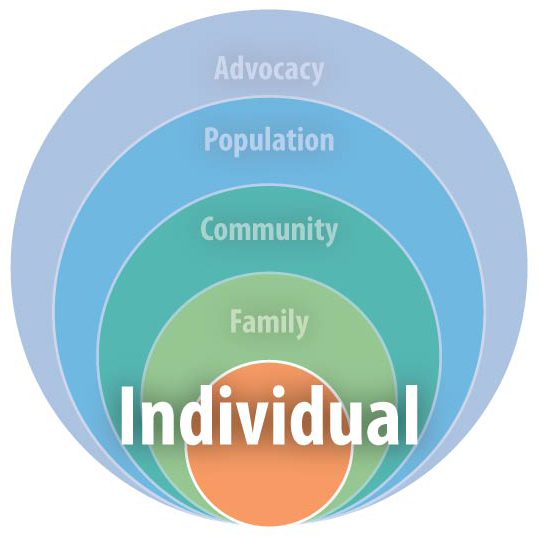
NURS475:
Lesson 3: Assessing Individuals in the Community with a Health Challenge/Chronic Illness
 You have identified an individual with a health challenge who is part of a larger population. In this lesson, you will be assessing this individual and describing this individual's health challenges in more depth. You will also be searching the scholarly literature for a scholarly article related to your individual's health challenge. You will reflect on the article and its application to your individual's health challenge in your clinical log.
You have identified an individual with a health challenge who is part of a larger population. In this lesson, you will be assessing this individual and describing this individual's health challenges in more depth. You will also be searching the scholarly literature for a scholarly article related to your individual's health challenge. You will reflect on the article and its application to your individual's health challenge in your clinical log.
The concept of noticing was discussed in the power point on Clinical Judgement in Lesson 1. Noticing is not the first step of the nursing process, assessment. Noticing is when the nurse will focus on the context, background and relationships (Tanner, 2006). As you progress through this module, what do you expect to see?
Course Objectives
- Synthesize knowledge from nursing and related sciences for application to evidence based nursing practice.
- Provide evidence based nursing care that contributes to safe and high quality patient outcomes within healthcare microsystems.
Lesson 3 Objectives
Upon completion of this lesson, you should be able to:
- Demonstrate awareness of the experience of illness from the client's perspective.
- Assess socio-cultural factors and their impact on the client's response to illness.
- Recognize the influence of a client's health behavior on illness
- Search for one scholarly article related to your individual's health challenge in the larger population.
- Complete the clinical log reflections based on the scholarly article found in the literature search.
Program Outcomes
- Integrate theory and knowledge from the sciences, social sciences, humanities, and nursing as a foundation for nursing practice.
- Apply the nursing process to manage care of individuals, families, and populations with respect for diversity in a variety of healthcare settings.
- Facilitate inter-professional and intra-professional communication and collaboration to improve practice, minimize risks, and optimize health outcomes.
- Critically analyze research studies and apply evidence-based findings to advance clinical practice.
- Demonstrate the inherent professional values and behaviors in the delivery of individual, families, and population-centered care.
Lesson Readings and Activities
- By the end of this lesson, complete the readings and activities found in the Course Schedule for Lesson 3.
Summary
After completing this lesson, you should have a good understanding of an individual with the health challenge you have identified. You will have completed Clinical Log 1 reflecting on your scholarly article and your assessment and interactions with the individual.
You will need to grasp other factors about noticing. These factors include values about the patient and family’s situation and the work environment, the culture of the unit, processes and procedures, situations that demand attention, and the setting’s intricacy (Tanner, 2006). Noticing these factors will guide you in the development of your clinical judgement.
A component of clinical judgement is reflection. In the Clinical Reflection Journals, you will be focusing on reflection in action and reflection on action. This compromises a major area in clinical judgement. Reflection in action is directing your comments on your capability to read the patient. While reflection on action has you focus on what you have gained from this experience (Tanner, 2006). This contributes to the development of clinical judgement.
Cultural Sensitivity and Bias
Cultural Sensitivity
Download the accompanying PowerPoint Presentation.
What Is Bias, and What Can Medical Professionals Do to Address It?
Lesson Activities and Assignments
Complete the following lesson activities and assignments:
Lesson 3 Assignment
1. Describe the individual’s health challenge/chronic illness. This is to be the story of how this person was first diagnosed or identified health challenge. It is to be more than one sentence.(4 points)
2. What lifestyle modifications will this individual need to consider making? (4 points)
- Short Term:
- Long Term:
3. What is the socio-cultural origin of the client and how does this affect his/her response to the illness? (5 points)
4. Describe the individual’s coping skills. (4 points)
- Effective
- Ineffective
5. Describe any ethical issues identified for the individual (actual or potential) (4 points).
6. Identify barriers to health services for this individual (actual or potential) (4 points).
7. Educational Needs Assessment (5 points)
- What are you most concerned about?
- What are your goals for learning how to take care of yourself?
- What do you feel you need to know to achieve your goals?
- What specific problems are you having?
- What do you know about your condition?
- What are you most interested in learning about?
- How will you manage your care at home?